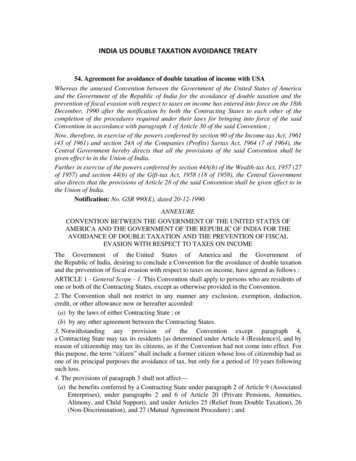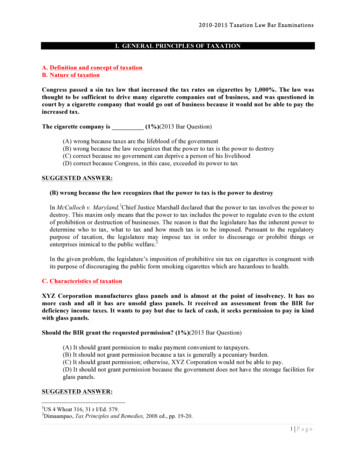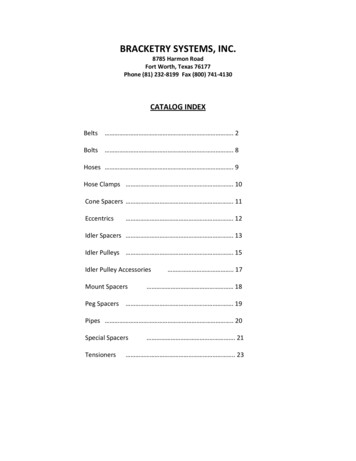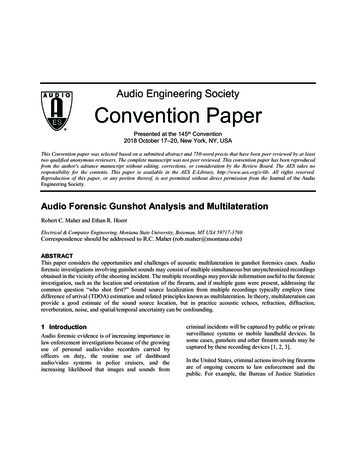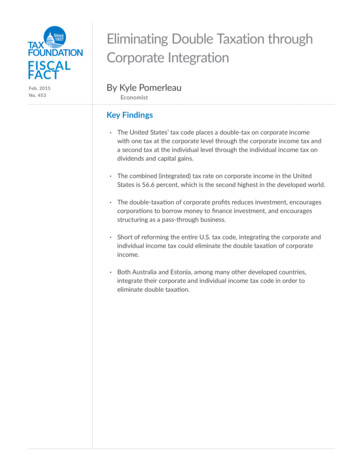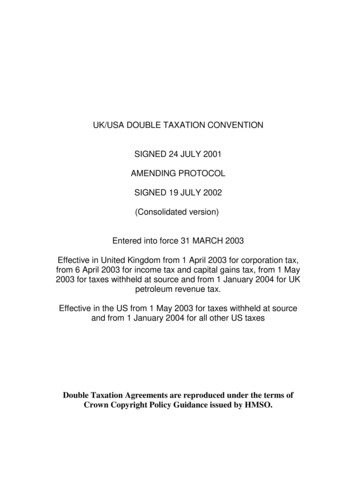
Transcription
UK/USA DOUBLE TAXATION CONVENTIONSIGNED 24 JULY 2001AMENDING PROTOCOLSIGNED 19 JULY 2002(Consolidated version)Entered into force 31 MARCH 2003Effective in United Kingdom from 1 April 2003 for corporation tax,from 6 April 2003 for income tax and capital gains tax, from 1 May2003 for taxes withheld at source and from 1 January 2004 for UKpetroleum revenue tax.Effective in the US from 1 May 2003 for taxes withheld at sourceand from 1 January 2004 for all other US taxesDouble Taxation Agreements are reproduced under the terms ofCrown Copyright Policy Guidance issued by HMSO.
CONTENTSArticle 1 (General scope)Article 2 (Taxes covered)Article 3 (General definitions)Article 4 (Residence)Article 5 (Permanent establishment)Article 6 (Income from real property)Article 7 (Business profits)Article 8 (Shipping and air transport)Article 9 (Associated enterprises)Article 10 (Dividends)Article 11 (Interest)Article 12 (Royalties)Article 13 (Gains)Article 14 (Income from employment)Article 15 (Directors’ fees)Article 16 (Entertainers and sportsmen)Article 17 (Pensions, social security, annuities, alimony, and childsupport)Article 18 (Pension schemes)Article 19 (Government service)Article 20 (Students)Article 20A (Teachers)Article 21 (Offshore exploration and exploitation activities)Article 22 (Other income)Article 23 (Limitation on benefits)Article 24 (Relief from double taxation)Article 25 (Non-discrimination)Article 26 (Mutual agreement procedure)Article 27 (Exchange of information and administrative assistance)Article 28 (Diplomatic agents and consular officers)Article 29 (Entry into force)Article 30 (Termination)Exchange of notes
CONVENTION BETWEEN THE GOVERNMENT OF THE UNITEDKINGDOM OF GREAT BRITAIN AND NORTHERN IRELAND AND THEGOVERNMENT OF THE UNITED STATES OF AMERICA FOR THEAVOIDANCE OF DOUBLE TAXATION AND THE PREVENTION OFFISCAL EVASION WITH RESPECT TO TAXES ON INCOME AND ONCAPITAL GAINSThe Government of the United Kingdom of Great Britain and Northern Irelandand the Government of the United States of America,Desiring to conclude a new Convention for the avoidance of double taxationand the prevention of fiscal evasion with respect to taxes on income and on capitalgains,Have agreed as follows:ARTICLE 1General scope1. Except as specifically provided herein, this Convention is applicable onlyto persons who are residents of one or both of the Contracting States.2. This Convention shall not restrict in any manner any benefit now orhereafter accorded:(a) by the laws of either Contracting State; or(b) by any other agreement between the Contracting States.3.(a) Notwithstanding the provisions of sub-paragraph b) of paragraph 2of this Article:(i) any question arising as to the interpretation or application ofthis Convention and, in particular, whether a taxation measure is withinthe scope of this Convention, shall be determined exclusively inaccordance with the provisions of Article 26 (Mutual AgreementProcedure) of this Convention; and(ii) the provisions of Article II and Article XVII of the GeneralAgreement on Trade in Services shall not apply to a taxation measureunless the competent authorities agree that the measure is not withinthe scope of Article 25 (Non-discrimination) of this Convention.(b) For the purposes of this paragraph, a "measure" is a law,regulation, rule, procedure, decision, administrative action, or any similar provision oraction.4. Notwithstanding any provision of this Convention except paragraph 5 of
this Article, a Contracting State may tax its residents (as determined under Article 4(Residence)), and by reason of citizenship may tax its citizens, as if this Conventionhad not come into effect.5.The provisions of paragraph 4 of this Article shall not affect:a) the benefits conferred by a Contracting State under paragraph 2 ofArticle 9 (Associated Enterprises), sub-paragraph b) of paragraph 1 andparagraphs 3 and 5 of Article 17 (Pensions, Social Security, Annuities,Alimony, and Child Support), paragraphs 1 and 5 of Article 18 (PensionSchemes) and Articles 24 (Relief From Double Taxation), 25 (Nondiscrimination), and 26 (Mutual Agreement Procedure) of this Convention;andb) the benefits conferred by a Contracting State under paragraph 2 ofArticle 18 (Pension Schemes) and Articles 19 (Government Service), 20(Students), 20A (Teachers), and 28 (Diplomatic Agents and ConsularOfficers) of this Convention, upon individuals who are neither citizens of, norhave been admitted for permanent residence in, that State."6. A former citizen or long-term resident whose loss of citizenship or longterm resident status had as one of its principal purposes the avoidance of tax (asdefined under the laws of the Contracting State of which the person was a citizen orlong-term resident) shall be treated for the purposes of paragraph 4 of this Article as acitizen of that Contracting State but only for a period of 10 years following the loss ofsuch status. This paragraph shall apply only in respect of income from sources withinthat Contracting State (including income deemed under the domestic law of that Stateto arise from such sources). Paragraph 4 of this Article shall not apply in the case ofany former citizen or long-term resident of a Contracting State who ceased to be acitizen or long-term resident of that State at any time before February 6th, 1995.7. Where under any provision of this Convention income or gains arising inone of the Contracting States are relieved from tax in that Contracting State and,under the law in force in the other Contracting State, a person, in respect of the saidincome or gains, is subject to tax by reference to the amount thereof which is remittedto or received in that other Contracting State and not by reference to the full amountthereof, then the relief to be allowed under this Convention in the first-mentionedContracting State shall apply only to so much of the income or gains as is taxed in theother Contracting State.8. An item of income, profit or gain derived through a person that is fiscallytransparent under the laws of either Contracting State shall be considered to bederived by a resident of a Contracting State to the extent that the item is treated for thepurposes of the taxation law of such Contracting State as the income, profit or gain ofa resident.Back to contents
ARTICLE 2Taxes covered1. This Convention shall apply to taxes on income and on capital gainsimposed on behalf of a Contracting State irrespective of the manner in which they arelevied.2. There shall be regarded as taxes on income and on capital gains all taxesimposed on total income, or on elements of income, including taxes on gains from thealienation of property.3. The existing taxes to which this Convention shall apply are:(a) in the case of the United States:(i) the Federal income taxes imposed by the Internal RevenueCode (but excluding social security taxes); and(ii) the Federal excise taxes imposed on insurance policiesissued by foreign insurers and with respect to private foundations;(b) in the case of the United Kingdom:(i) the income tax;(ii) the capital gains tax;(iii) the corporation tax; and(iv) the petroleum revenue tax.4. This Convention shall apply also to any identical or substantially similartaxes that are imposed after the date of signature of this Convention in addition to, orin place of, the existing taxes. The competent authorities of the Contracting Statesshall notify each other of any changes that have been made in their respective taxationor other laws that significantly affect their obligations under this Convention.Back to contentsARTICLE 3General definitions1. For the purposes of this Convention, unless the context otherwise requires:(a) the term "person" includes an individual, an estate, a trust, apartnership, a company, and any other body of persons;
(b) the term "company" means any body corporate or any entity that istreated as a body corporate for tax purposes;(c) the term “enterprise” applies to the carrying on of any business;(d) the term “business” includes the performance of professionalservices and of other activities of an independent character;(e) the terms "enterprise of a Contracting State" and "enterprise of theother Contracting State" mean respectively an enterprise carried on by aresident of a Contracting State, and an enterprise carried on by a resident ofthe other Contracting State;(f) the term "international traffic" means any transport by a ship oraircraft, except when the ship or aircraft is operated solely between places inthe other Contracting State;(g) the term "competent authority" means:(i) in the United States: the Secretary of the Treasury or hisdelegate; and(ii) in the United Kingdom: the Commissioners of InlandRevenue or their authorised representative;(h) the term "United States" means the United States of America, andincludes the states thereof and the District of Columbia; such term alsoincludes the territorial sea thereof and the sea bed and sub-soil of thesubmarine areas adjacent to that territorial sea, over which the United Statesexercises sovereign rights in accordance with international law; the term,however, does not include Puerto Rico, the Virgin Islands, Guam or any otherUnited States possession or territory;(i) the term “United Kingdom” means Great Britain and NorthernIreland, including any area outside the territorial sea of the United Kingdomwhich in accordance with international law has been or may hereafter bedesignated, under the laws of the United Kingdom concerning the ContinentalShelf, as an area within which the rights of the United Kingdom with respectto the sea bed and sub-soil and their natural resources may be exercised;(j) the term "national" of a Contracting State, means:(i) in relation to the United States,(A) any individual possessing the citizenship of theUnited States; and(B) any legal person, partnership, association or otherentity deriving its status as such from the laws in force in theUnited States;
(ii) in relation to the United Kingdom,(A) any British citizen, or any British subject notpossessing the citizenship of any other Commonwealth countryor territory, provided he has the right of abode in the UnitedKingdom; and(B) any legal person, partnership, association or otherentity deriving its status as such from the laws in force in theUnited Kingdom;(k) the term "qualified governmental entity" means:(i) a Contracting State, or a political subdivision or localauthority of a Contracting State;(ii) a person that is wholly owned, directly or indirectly, by aContracting State or a political subdivision or local authority of aContracting State, provided(A) it is organized under the laws of the ContractingState;(B) its earnings are credited to its own account with noportion of its income inuring to the benefit of any privateperson;(C) its assets vest in the Contracting State, politicalsubdivision or local authority upon dissolution; and(D) it does not carry on a business;(l) the term “Contracting State” means the United States or the UnitedKingdom, as the context requires;(m) the term “real property” means any interest (other than an interestsolely as a creditor) in land, crops or timber growing on land, mines, wellsand other places of extraction of natural resources, as well as any fixturebuilt on land (buildings, structures, etc.) and other property considered realor immovable property under the law of the Contracting State in which theproperty in question is situated. The term shall in any case includelivestock and equipment used in agriculture and forestry, rights to whichthe provisions of general law respecting landed property apply, usufruct ofreal property and rights to variable or fixed payments as consideration forthe working of, or the right to work, mineral deposits and other naturalresources; ships, boats and aircraft shall not be regarded as real property.(n) the term “conduit arrangement” means a transaction or series oftransactions:
(i) which is structured in such a way that a resident of aContracting State entitled to the benefits of this Convention receives anitem of income arising in the other Contracting State but that residentpays, directly or indirectly, all or substantially all of that income (atany time or in any form) to another person who is not a resident ofeither Contracting State and who, if it received that item of incomedirect from the other Contracting State, would not be entitled under aconvention for the avoidance of double taxation between the state inwhich that other person is resident and the Contracting State in whichthe income arises, or otherwise, to benefits with respect to that item ofincome which are equivalent to, or more favourable than, thoseavailable under this Convention to a resident of a Contracting State;and(ii) which has as its main purpose, or one of its main purposes,obtaining such increased benefits as are available under thisConvention.o) the term “pension scheme” means any plan, scheme, fund, trust orother arrangement established in a Contracting State which is:(i) generally exempt from income taxation in that State; and(ii) operated principally to administer or provide pension orretirement benefits or to earn income for the benefit of one or moresuch arrangements.2. As regards the application of this Convention at any time by a ContractingState, any term not defined therein shall, unless the context otherwise requires, or thecompetent authorities agree on a common meaning pursuant to the provisions ofArticle 26 (Mutual Agreement Procedure) of this Convention, have the meaningwhich it has at that time under the law of that State for the purposes of the taxes towhich this Convention applies, any meaning under the applicable tax laws of thatState prevailing over a meaning given to the term under other laws of that State.Back to contentsARTICLE 4Residence1. Except as provided in paragraphs 2 and 3 of this Article, the term "residentof a Contracting State" means, for the purposes of this Convention, any person who,under the laws of that State, is liable to tax therein by reason of his domicile,
residence, citizenship, place of management, place of incorporation, or any othercriterion of a similar nature. This term, however, does not include any person who isliable to tax in that State in respect only of income from sources in that State or ofprofits attributable to a permanent establishment in that State.2. An individual who is a United States citizen or an alien admitted to theUnited States for permanent residence (a “green card” holder) is a resident of theUnited States only if the individual has a substantial presence, permanent home orhabitual abode in the United States and if that individual is not a resident of a Stateother than the United Kingdom for the purposes of a double taxation conventionbetween that State and the United Kingdom.3. The term “resident of a Contracting State” includes:(a) a pension scheme;(b) a plan, scheme, fund, trust, company or other arrangementestablished in a Contracting State that is operated exclusively to administer orprovide employee benefits and that, by reason of its nature as such, isgenerally exempt from income taxation in that State;(c) an organization that is established exclusively for religious,charitable, scientific, artistic, cultural, or educational purposes and that is aresident of a Contracting State according to its laws, notwithstanding that allor part of its income or gains may be exempt from tax under the domestic lawof that State; and(d) a qualified governmental entity that is, is a part of, or is establishedin, that State.4. Where by reason of the provisions of paragraph 1 of this Article, anindividual is a resident of both Contracting States, then his status shall be determinedas follows:(a) he shall be deemed to be a resident only of the State in which hehas a permanent home available to him; if he has a permanent home availableto him in both States, he shall be deemed to be a resident only of the State withwhich his personal and economic relations are closer (centre of vital interests);(b) if the State in which he has his centre of vital interests cannot bedetermined, or if he does not have a permanent home available to him in eitherState, he shall be deemed to be a resident only of the State in which he has anhabitual abode;(c) if he has an habitual abode in both States or in neither of them, heshall be deemed to be a resident only of the State of which he is a national;(d) if he is a national of both States or of neither of them, thecompetent authorities of the Contracting States shall endeavour to settle thequestion by mutual agreement.
5. Where by reason of the provisions of paragraph 1 of this Article a personother than an individual is a resident of both Contracting States, the competentauthorities of the Contracting States shall endeavour to determine by mutualagreement the mode of application of this Convention to that person. If the competentauthorities do not reach such an agreement, that person shall not be entitled to claimany benefit provided by this Convention, except those provided by paragraph 4 ofArticle 24 (Relief from Double Taxation), Article 25 (Non-discrimination) and Article26 (Mutual Agreement Procedure).6. A marriage before January 1st, 1974 between a woman who is a UnitedStates national and a man domiciled within the United Kingdom shall be deemed tohave taken place on January 1st, 1974 for the purpose of determining her domicile forUnited Kingdom tax purposes, on or after the date on which this Convention first haseffect in relation to her.Back to contentsARTICLE 5Permanent establishment1. For the purposes of this Convention, the term "permanent establishment"means a fixed place of business through which the business of an enterprise is whollyor partly carried on.2. The term "permanent establishment" includes especially:(a) a place of management;(b) a branch;(c) an office;(d) a factory;(e) a workshop; and(f) a mine, an oil or gas well, a quarry, or any other place of extractionof natural resources.3. A building site or construction or installation project constitutes apermanent establishment only if it lasts for more than twelve months.4. Notwithstanding the preceding provisions of this Article, the term"permanent establishment" shall be deemed not to include:(a) the use of facilities solely for the purpose of storage, display ordelivery of goods or merchandise belonging to the enterprise;
(b) the maintenance of a stock of goods or merchandise belonging tothe enterprise solely for the purpose of storage, display or delivery;(c) the maintenance of a stock of goods or merchandise belonging tothe enterprise solely for the purpose of processing by another enterprise;(d) the maintenance of a fixed place of business solely for the purposeof purchasing goods or merchandise, or of collecting information, for theenterprise;(e) the maintenance of a fixed place of business solely for the purposeof carrying on, for the enterprise, any other activity of a preparatory orauxiliary character;(f) the maintenance of a fixed place of business solely for anycombination of the activities mentioned in sub-paragraphs (a) to (e) of thisparagraph, provided that the overall activity of the fixed place of businessresulting from this combination is of a preparatory or auxiliary character.5. Notwithstanding the provisions of paragraphs 1 and 2 of this Article, wherea person - other than an agent of an independent status to whom paragraph 6 of thisArticle applies - is acting on behalf of an enterprise and has and habitually exercisesin a Contracting State an authority to conclude contracts that are binding on theenterprise, that enterprise shall be deemed to have a permanent establishment in thatState in respect of any activities that the person undertakes for the enterprise, unlessthe activities of such person are limited to those mentioned in paragraph 4 of thisArticle that, if exercised through a fixed place of business, would not make this fixedplace of business a permanent establishment under the provisions of that paragraph.6. An enterprise shall not be deemed to have a permanent establishment in aContracting State merely because it carries on business in that State through a broker,general commission agent, or any other agent of an independent status, provided thatsuch person is acting in the ordinary course of his business as an independent agent.7. The fact that a company that is a resident of a Contracting State controls oris controlled by a company that is a resident of the other Contracting State, or thatcarries on business in that other State (whether through a permanent establishment orotherwise), shall not constitute either company a permanent establishment of theother.Back to contentsARTICLE 6Income from real property1. Income derived by a resident of a Contracting State from real property,including income from agriculture or forestry, situated in the other Contracting Statemay be taxed in that other State.2. The provisions of paragraph 1 of this Article shall apply to income derivedfrom the direct use, letting, or use in any other form of real property.
3. The provisions of paragraphs 1 and 2 of this Article shall also apply to theincome from real property of an enterprise.Back to contentsARTICLE 7Business profits1. The business profits of an enterprise of a Contracting State shall be taxableonly in that State unless the enterprise carries on business in the other ContractingState through a permanent establishment situated therein. If the enterprise carries onbusiness as aforesaid, the business profits of the enterprise may be taxed in the otherState but only so much of them as are attributable to that permanent establishment.2. Subject to the provisions of paragraph 3 of this Article, where an enterpriseof a Contracting State carries on business in the other Contracting State through apermanent establishment situated therein, there shall in each Contracting State beattributed to that permanent establishment the business profits that it might beexpected to make if it were a distinct and separate enterprise engaged in the same orsimilar activities under the same or similar conditions and dealing whollyindependently with the enterprise of which it is a permanent establishment. For thispurpose, the business profits to be attributed to the permanent establishment shallinclude only the profits derived from the assets used, risks assumed and activitiesperformed by the permanent establishment.3. In determining the business profits of a permanent establishment, thereshall be allowed as deductions expenses that are incurred for the purposes of thepermanent establishment, including executive and general administrative expenses soincurred, whether in the State in which the permanent establishment is situated orelsewhere.4. For the purposes of the preceding paragraphs, the profits to be attributed tothe permanent establishment shall be determined by the same method year by yearunless there is good and sufficient reason to the contrary.5. The United States excise tax on insurance policies issued by foreigninsurers shall not be imposed on insurance or reinsurance policies, the premiums onwhich are the receipts of a business of insurance carried on by an enterprise of theUnited Kingdom. However, if such policies are entered into as part of a conduitarrangement, the United States may impose excise tax on those policies, unless thepremiums in respect of those policies are, or are part of, the income of a permanentestablishment that the enterprise of the United Kingdom has in the United States.6. Where business profits include items of income that are dealt withseparately in other Articles of this Convention, then the provisions of those Articlesshall not be affected by the provisions of this Article.7. In applying this Article, paragraph 5 of Article 10 (Dividends), paragraph 3of Article 11 (Interest), paragraph 3 of Article 12 (Royalties), and paragraph 2 of
Article 22 (Other Income) of this Convention, income or profits attributable to apermanent establishment may, notwithstanding that the permanent establishment hasceased to exist, be taxed in the Contracting State in which it was situated.Back to contentsARTICLE 8Shipping and air transport1. Profits of an enterprise of a Contracting State from the operation of ships oraircraft in international traffic shall be taxable only in that State.2. For the purposes of this Article, profits from the operation of ships oraircraft include profits derived from the rental of ships or aircraft on a full (time orvoyage) basis. They also include profits from the rental of ships or aircraft on abareboat basis if the rental income is incidental to profits from the operation of shipsor aircraft in international traffic. Profits derived by an enterprise from the inlandtransport of property or passengers within either Contracting State shall be treated asprofits from the operation of ships or aircraft in international traffic if such transport isundertaken as part of international traffic conducted by such enterprise.3. Profits of an enterprise of a Contracting State from the use, maintenance, orrental of containers (including trailers, barges and related equipment for the transportof containers) used in international traffic shall be taxable only in that State.4. The provisions of paragraphs 1 and 3 of this Article shall also apply toprofits from participation in a pool, a joint business, or an international operatingagency.Back to contentsARTICLE 9Associated enterprises1. Where:(a) an enterprise of a Contracting State participates directly orindirectly in the management, control or capital of an enterprise of the otherContracting State; or(b) the same persons participate directly or indirectly in themanagement, control, or capital of an enterprise of a Contracting State and anenterprise of the other Contracting State,and in either case conditions are made or imposed between the two enterprises in theircommercial or financial relations that differ from those that would be made betweenindependent enterprises, then any profits that, but for those conditions, would haveaccrued to one of the enterprises, but by reason of those conditions have not soaccrued, may be included in the profits of that enterprise and taxed accordingly.
2. Where a Contracting State includes in the profits of an enterprise of thatState, and taxes accordingly, profits on which an enterprise of the other ContractingState has been charged to tax in that other State, and the other Contracting Stateagrees that the profits so included are profits that would have accrued to the enterpriseof the first-mentioned State if the conditions made between the two enterprises hadbeen those that would have been made between independent enterprises, then thatother State shall make an appropriate adjustment to the amount of the tax chargedtherein on those profits. In determining such adjustment, due regard shall be paid tothe other provisions of this Convention and the competent authorities of theContracting States shall if necessary consult each other.Back to contentsARTICLE 10Dividends1. Dividends paid by a company which is a resident of a Contracting State toa resident of the other Contracting State may be taxed in that other State.2. However, such dividends may also be taxed in the Contracting State ofwhich the company paying the dividends is a resident and according to the laws ofthat State, but if the dividends are beneficially owned by a resident of the otherContracting State, the tax so charged shall not exceed, except as otherwise provided,(a) 5 per cent. of the gross amount of the dividends if the beneficialowner is a company that owns shares representing directly or indirectly at least10 per cent. of the voting power of the company paying the dividends;(b) 15 per cent. of the gross amount of the dividends in all other cases.This paragraph shall not affect the taxation of the company in respect of the profitsout of which the dividends are paid.3. Notwithstanding the provisions of paragraph 2 of this Article, dividendsshall not be taxed in the Contracting State of which the company paying the dividendsis a resident if the beneficial owner of the dividends is a resident of the otherContracting State and either:(a) a company that has owned shares representing 80 per cent. or moreof the voting power of the company paying the dividends for a 12-monthperiod ending on the date the dividend is declared, and that:(i) owned shares representing, directly or indirectly, at least 80per cent. of the voting power of the company paying the dividendsprior to October 1st, 1998; or(ii) is a qualified person by reason of sub-paragraph c) ofparagraph 2 of Article 23 (Limitation on Benefits) of this Convention;or
(iii) is entitled to benefits with respect to the dividends underparagraph 3 or paragraph 6 of that Article; or(b) a pension scheme, provided that such dividends are not derivedfrom the carrying on of a business, directly or indirectly, by such pensionscheme.4. Sub-paragraph a) of paragraph 2 and sub-paragraph a) of paragraph 3 ofthis Article shall not apply in the case of dividends paid by a pooledinvestment vehicle which is a resident of a Contracting State. Sub-paragraphb) of paragraph 2 and sub-paragraph b) of paragraph 3 of this Article shallapply in the case of dividends paid by a pooled investment vehicle, the assetsof which consist wholly or mainly of shares, securities or currencies orderivative contracts relating to shares, securities or currencies. In the case ofdividends paid by a pooled investment vehicle not described in the precedingsentence, sub-paragraph b) of paragraph 2 and sub-paragraph b) of paragraph3 of this Article shall apply only ifa) the beneficial owner of the dividends is an individual or pensionscheme, in either case holding an interest of not more than 10 per cent
UK/USA DOUBLE TAXATION CONVENTION SIGNED 24 JULY 2001 AMENDING PROTOCOL SIGNED 19 JULY 2002 (Consolidated version) Entered into force 31 MARCH 2003 Effective in United Kingdom from 1 April 2003 for corporation tax, from 6 April 2003 for income tax and capital gains tax, from 1 May 2003 for taxes withheld at source and from 1 January 2004 for UK
